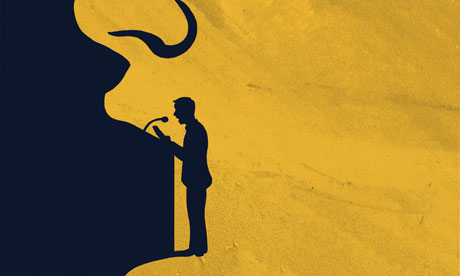
This is the story of one of the most popular inspirational quotations in the history of inspirational quotations. These days, it's everywhere – on T-shirts and posters, in self-help books, religious and business books. But let's examine its origin. It's 1994, and a spine-tingling moment as Nelson Mandela addresses a crowd of thousands in Cape Town on the occasion of his inauguration as South Africa's president. "Our deepest fear," he intones, "is not that we are inadequate. Our deepest fear is that we are powerful beyond measure. It is our light, not our darkness, that most frightens us. We ask ourselves, who am I to be brilliant, gorgeous, talented, fabulous? Actually, who are you not to be? You are a child of God. Your playing small doesn't serve the world… As we let our own light shine, we unconsciously give other people permission to do the same. As we are liberated from our own fear, our presence automatically liberates others."
Can you picture the scene? Of course you can't. As the literature professor Brian Morton pointed out in a recent New York Times essay, it's not just that Mandela never said these words; it's that it's preposterous to imagine he might have done so. Having led his nation from the horrors of apartheid, and now steeling its people for the challenges ahead, would Mandela really have focused on the importance of being gorgeous and fabulous? Whatever extraordinary strengths got him through almost three decades on Robben Island, it's stretching the limits of language to label them "fabulous". The Nelson Mandela Foundation confirms that he didn't say these words in any speech its archivists know of. And yet there it is, confidently misattributed in hundreds of books, including several political and historical works from academic publishers, as well as a leadership manual from the Outward Bound USA organisation and a book entitled In The Words Of Nelson Mandela. Oh, and once in the Guardian, I'm afraid.
The real source is A Return To Love, by Marianne Williamson, a book about the vaguely cultish spiritual teaching known as A Course In Miracles. The course's author, Helen Schucman, claimed it was dictated to her by an "inner voice" belonging to Jesus. A lot of different people were involved, then. But Mandela wasn't one of them.
Quotes get misattributed or mangled all the time, especially "inspirational" ones: as Morton notes, Thoreau didn't quite say "go confidently in the direction of your dreams!" and Gandhi didn't say "be the change you wish to see in the world". "Quotations," to quote the critic Louis Menand, "are prostheses", allowing you to borrow "another person's brainwaves and [put] them to your own use" – and borrowing Mandela's brainwaves is simply more impressive than borrowing Marianne Williamson's.
In this case, though, there's another interesting aspect: the Mandela attribution has allowed those of us who scorn new-age kookiness to take the quote seriously. Yet, uncomfortable as it may be, new-age kooks sometimes say profoundly powerful things. I'll admit it: I find Williamson's words inspiring. Fear does keep us small; living at your fullest takes guts. None of this needs a fake Mandela attribution to be worth absorbing. So you like a new-age writer's insights? So what? As Virginia Woolf famously put it: "It's all good. Just go with it."
• oliver.burkeman@theguardian.com; twitter.com/oliverburkeman

